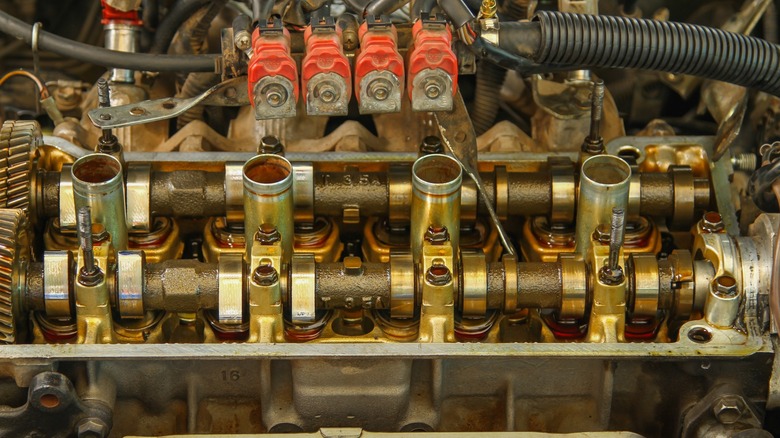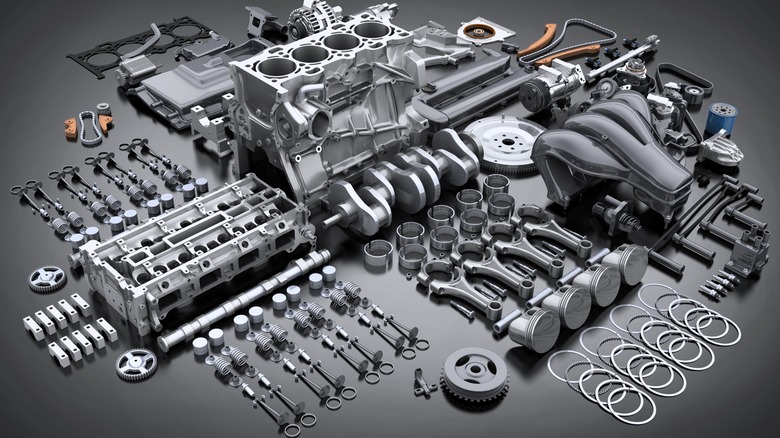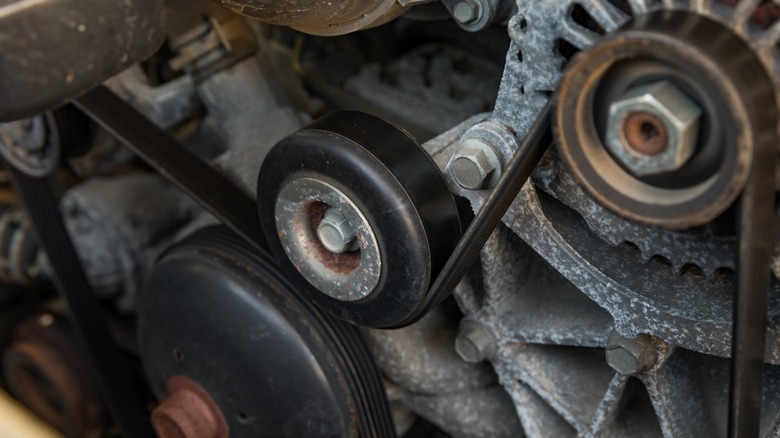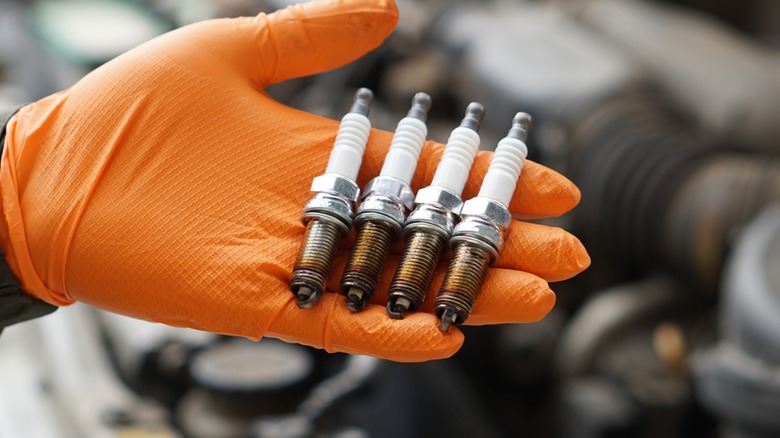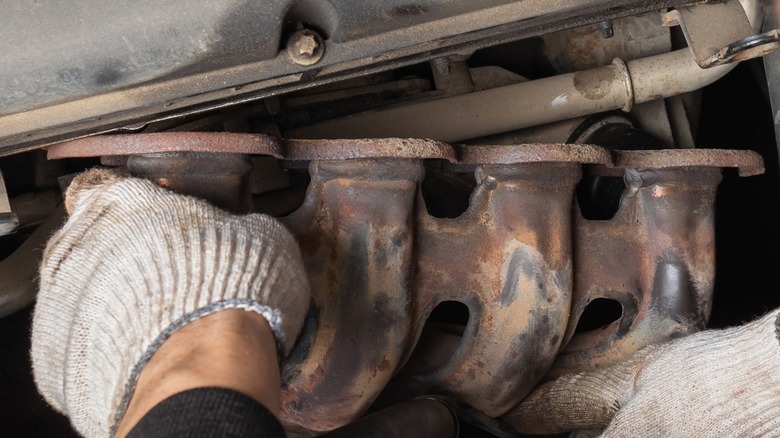Why There's A Ticking Sound In Your Engine When It's Idle & Should You Be Concerned
We may receive a commission on purchases made from links.
Car engines derive power from thousands of miniature explosions contained within their cylinders every minute. We quickly become accustomed to the noises they make when we start them, while they're at idle, and after we've shut them down upon arriving at our destination. However, when a new engine noise is heard, we want to know what is causing it, and how do we fix it.
As a long time gearhead, throughout many years working on various vehicles, I've had a number of friends and family members call seeking help with strange engine noises. First, I need to know what the new noise sounds like before I can attempt to diagnose its source. This often leads to a hilarious round of attempted mimicry by the car's owner that may or may not be accurate, but will at least bring me a little joy until I can hear it in person.
The good news is that ticking engine sounds, especially those without an associated "Check Engine Light" (CEL), are often minor issues with relatively inexpensive repairs. However, if your idling engine makes a new ticking sound accompanied by the dreaded CEL, rough idle due to misfire, or smoke from the exhaust pipe, it could indicate more serious problems. Based on my personal experiences working on these issues, and deep-diving research, here are the most common culprits for an engine idle ticking sound.
Engine valvetrain lifter tick
Most car engines employ a number of valves to control the flow of the air-fuel mixture into the cylinders and the expulsion of exhaust gas at precisely timed intervals. In some cases, these valves are operated by a system of pushrods riding atop hydraulic lifters.
In the days of old and still in some high performance engines the lifters were solid and valvetrain lash, the clearance necessary for smooth operation, had to be adjusted manually. Hydraulic lifters relieved that requirement, using oil pressure to keep the system operating as it should. While this shortened the list of DIY maintenance tasks, the system is not without flaws.
Hopefully the cause of your engine lifter tick is as simple as low, or dirty, engine oil levels. Check the oil level, add the appropriate amount of approved engine oil as recommended by the owner's manual, or change the oil if needed. Did that fix it? If not, it could be a bad lifter.
If your ride has a HEMI engine, especially one that's allowed to idle for long periods, you could be hearing the famous HEMI tick. The HEMI tick, often accompanied by a CEL and rough idle, occurs due to the failure of the lifter and its roller bearing. When the lifter fails, it allows the roller to jump off the camshaft lobe surface and collide with it when the lobe comes back around. This contact destroys the roller and wears the camshaft lobe abnormally, causing the need for extensive repairs.
Internal engine parts can tick when worn
In addition to lifters, there are a number of internal engine parts that can cause ticking sounds as they wear. Some sounds are nothing to worry about, especially the ones that only occur for a few seconds after a cold startup but go away quickly. Others can be an indication that you don't have unlimited time with your car before needing to trade it or think about rebuilding or replacing the engine.
Some of the more common, and easily replaced, causes of internal engine ticking involve the valvetrain again. Sometimes a valve spring can break causing rough idle and could lead to valve and piston damage, but a more likely culprit is the timing chain, or timing belt depending on how your car is equipped.
Timing chains and belts are a flexible link between your engine's crankshaft, around which the pistons operate, and the camshaft(s) that operate the valvetrain. The timing between these components is critical and being "out-of-time" can cause rough idle, poor performance, decreased fuel economy, engine damage, and ticking sounds. A timing chain/belt stretches as it becomes worn, allowing it to slap around underneath the timing chain cover, creating a lot of noise.
The good news, it's relatively easy to repair as long as it's caught before more damage is done. Not as easy as replacing windshield wipers but way easier than replacing engine bearings, another potential source of ticking sounds. Engine bearing ticking or knocking is an indication that your engine needs an overhaul.
External engine components can emit ticking sounds too
Opening a newer car hood generally reveals an expanse of plastic shrouds that hide a plethora of moving parts underneath. If you've ever peeked inside the engine bay of a classic car or truck at a car show, you've seen the carefully orchestrated mass of hoses, belts, fans, and other components still in use on today's cars, only now hidden. Several of these components can cause ticking sounds.
On those older engines, you may have seen a few belts radiating from the crankshaft pulley. One looped around the water pump and also drove the fan. Another went to the alternator or generator. Others engaged the power steering pump or maybe even an air conditioner compressor, if equipped.
Modern cars often use a single belt that snakes its way around these components along with idler pulleys and tensioners, aptly named a serpentine Belt. While your car may use battery powered fans to move air through the radiator, those, along with any of the belt driven items and the belt itself, can cause ticking sounds.
Ignition system ticking sounds
In addition to the concert of whirling belts, spinning crankshafts, and reciprocating valves, your car's ignition system plays a role in the engine's operation and can signal problems with ticking sounds too. Some cars generate an electrical current from a centralized coil that's distributed through spark plug cables to the spark plugs, where it delivers a precisely timed spark to ignite the fuel-air mixture in each cylinder. Others use individual coil packs at each cylinder to deliver the current to the spark plug.
Damage or excessive wear to any of the components that carry the electrical charge could cause the system to break down and not deliver the spark required for the engine to run smoothly. The resulting misfire can cause the engine to shake and rattle, during which any number of noises might be heard.
The spark plugs themselves are another area of concern. They have an electrode through their center that's insulated by a hard, yet brittle, porcelain-like coating. If that coating cracks, the charge inside could arc and cause a ticking sound. Of more concern is the end of the spark plug breaking off inside the cylinder, bouncing around and causing damage, ticking its little head off, so to speak.
Exhaust system ticking sounds
Along with the potential ticking sounds associated with an engine's moving parts and ignition system, another cause of odd noises is the exhaust system. The exhaust system doesn't get much attention from most car owners, as is typical for those that do the dirty jobs, but it performs an important function nonetheless.
As the hot exhaust gas is expelled from each cylinder it's forced through ports in the cylinder head into the exhaust manifold or header, out the exhaust pipe, through the catalytic converter, hushed by a muffler, and ultimately exits the tailpipe. Each of these transitions represents a joint that's either clamped or in some cases welded shut. The system is subject to some internal pressure, high heat, and copious amounts of corrosion from road grime, splashing water, and winter salt applied to the roads. On top of all that abuse, people rarely spend much time washing the underside of their car.
If any of the exhaust system components fails, especially those closest to the engine, the resulting exhaust leak can cause a ticking sound. We should also discuss the sensors present on the exhaust system that, upon failing, can trigger a CEL and cause rough engine idle.
With the variety of causes and range of ticking sounds possible, it's important to correctly diagnose your engine's ticking sounds. While owning a diagnostic tool could save you money (Amazon has a great selection), sometimes it's best to pay for a professional opinion, even for hardcore DIY mechanics.

